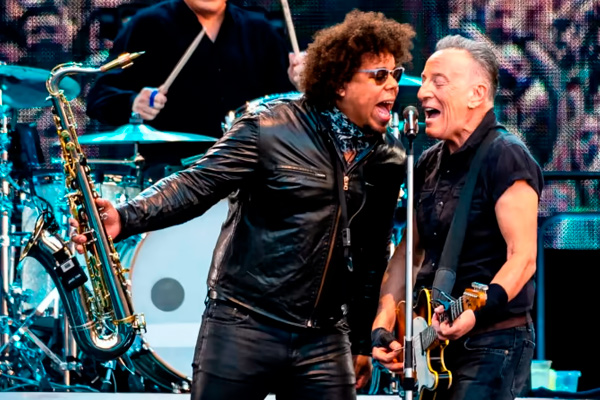The 73-year-old entertainer displayed heroic endurance at Murrayfield Stadium, supported by the E Street Band.
At some point during Bruce Springsteen’s colossal performances, our hero collapses to his knees, perspiration dripping from his bowed head, seemingly exhausted by the Herculean effort of it all. Uncharacteristically, his supporting musicians in the E Street Band discontinue their thunderous rama-lama-ding-dong and fall silent. However, a switch is then thrown. Springsteen rises to his feet and unleashes a ferocious bellow. Never underestimate him.
This ritual is connected to the archetypal American themes of difficulty and rebirth that run throughout his music like improved versions of presidential campaign slogans. The US record for his prolonged performances was achieved in 2016 at just over four hours. I mean this in the context of epic battles and valiant protagonists who are up against it, not gazing at your watch and planning a visit to the bar. Similar to Sylvester Stallone’s combatant in the movie Rocky, Bruce Springsteen must endure a beating before achieving victory. Successful concerts are hard-won by the New Jersey blue-collar songwriter.
The current engagement is his first with the E Street Band since 2017. Before it began, there was controversy in the United States over high ticket prices, which appeared to be aimed at high earners rather than low earners. The first concert in the United Kingdom took place at Edinburgh’s Murrayfield Stadium under a brilliant blue sky, seemingly ripped from the Scottish climate by Springsteen’s unquenchable optimism. However, there was also, initially at least, a faint but rainy suspicion that this may be too much for the ageing performer.
He began with a series of sleeves-rolled rumblers, complete with “One, two, three, four!” countdowns and pounding percussion. “Now I’m ready to grow young again,” he yelled in the first of them, “No Surrender” from his 1984 hit Born in the USA. The following composition was “Ghosts” from his most recent album with the E Street Band, Letter to You, released in 2020. The similarity in musical style between these records made the passage of time appear illusory. But Springsteen is now 73 years old, and the majority of the E Street Band are also septuagenarians. Their brand of strenuous musicianship has adopted a new type of effort.
The three-hour performance took place beneath the proscenium arch, devoid of catwalks and thrust stages. Horn players and backup singers joined Springsteen and his E Street bandmates. The vocalist cringed at the microphone, mouth turned downward, neck tendons tensing as if they were cables. But absent were the physical exertions of the past. Knees of pensionable age were not tested by being stomped on, nor were perspiration glands wrung out. Instead, he played numerous guitar solos, which careened through the melodies like escape vehicles. Jake Clemons, relative of original sideman Clarence Clemons, contributed notable saxophone parts.

Springsteen’s vocal appeared to explode on a raspy rendition of “Kitty’s Back” from The Wild, the Innocent & the E Street Shuffle, a 1973 album deep cut. This suggestion of waning authority, however, was incorporated into the staging itself through the use of showmanship. For “Mary’s Place,” the singer employed a stage murmur, hushing the audience, before resuming his bellow in response to “Turn it up!” calls from the congregationalists in the audience. Then, at the exact midpoint of the set, a revised endurance-test routine was performed.
It began with his first remarks to the stadium’s audience of sixty thousand, in which he reflected on his first band, The Castiles, and their late frontman. “Last Man Standing” followed, a muscular E Street lament in which Springsteen sang affectingly about being the solitary surviving member of that long-ago adolescent group. Next up was “Backstreets” from his breakthrough album Born to Run, released in 1975, which seemed to gush forth from the stage like an endless river. The switch was turned on once more.
The second portion of the performance was a triumphant march. The song “Because the Night” sparked a mass singalong, while other highlights came from Springsteen’s less acclaimed albums. “Wrecking Ball,” a fiddle-accompanied stomper about difficult times, competed with classics like “Born in the USA.” The E Street Band left the stage following “Tenth Avenue Freeze-out,” a barroom raucous accompanied by projected images of deceased compatriots Clarence Clemons, who passed away in 2011, and keyboardist Danny Federici, who passed away in 2008.
Springsteen performed the concluding song on acoustic guitar and mouth organ by himself. The song “I’ll See You in My Dreams” highlighted the motif of mortality that ran throughout the performance, the ultimate endurance test. “Death is not the end,” he sobbed. Under a clear night sky with chants of “Bruuuce!” resonating, the victor could not be questioned.




